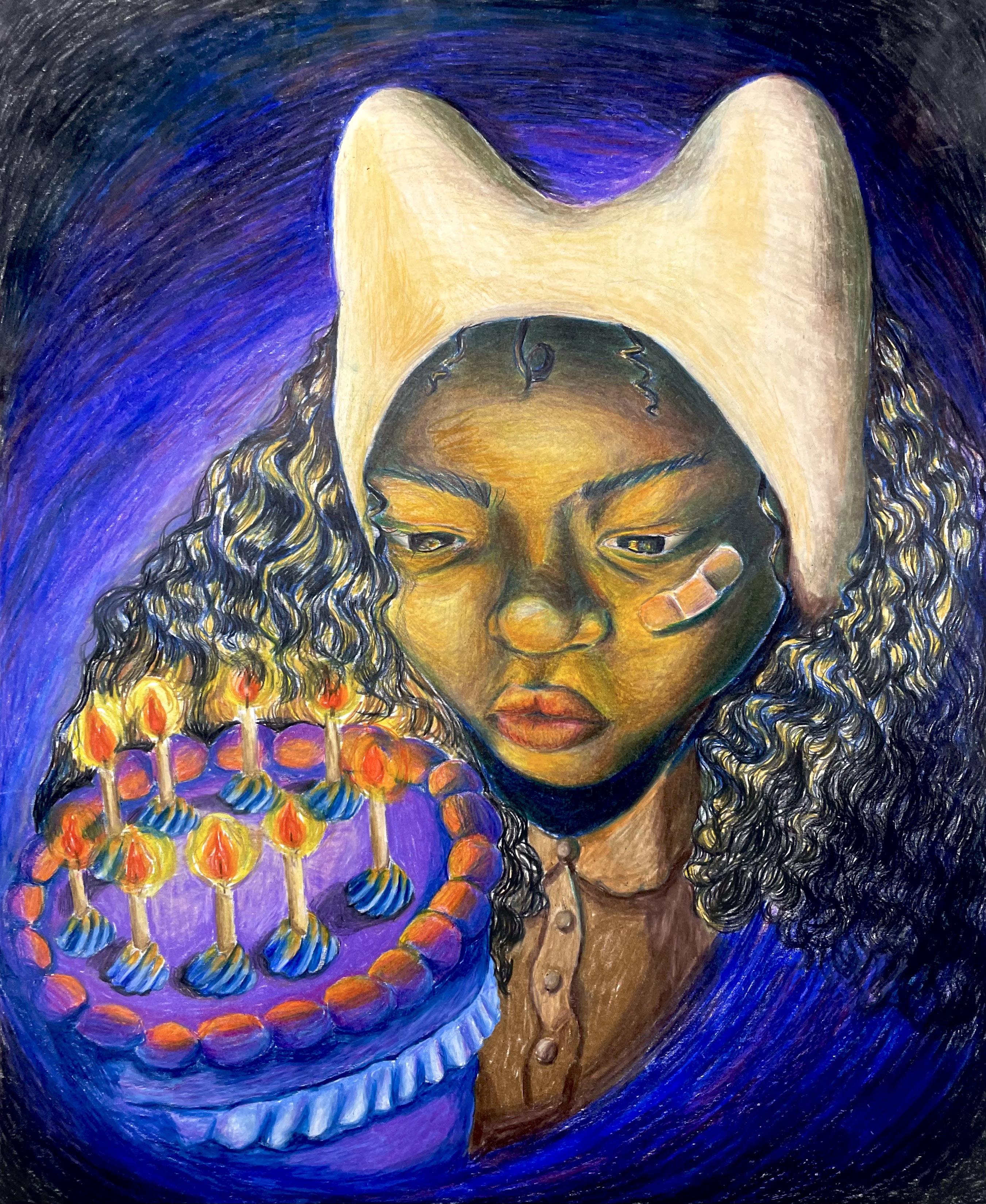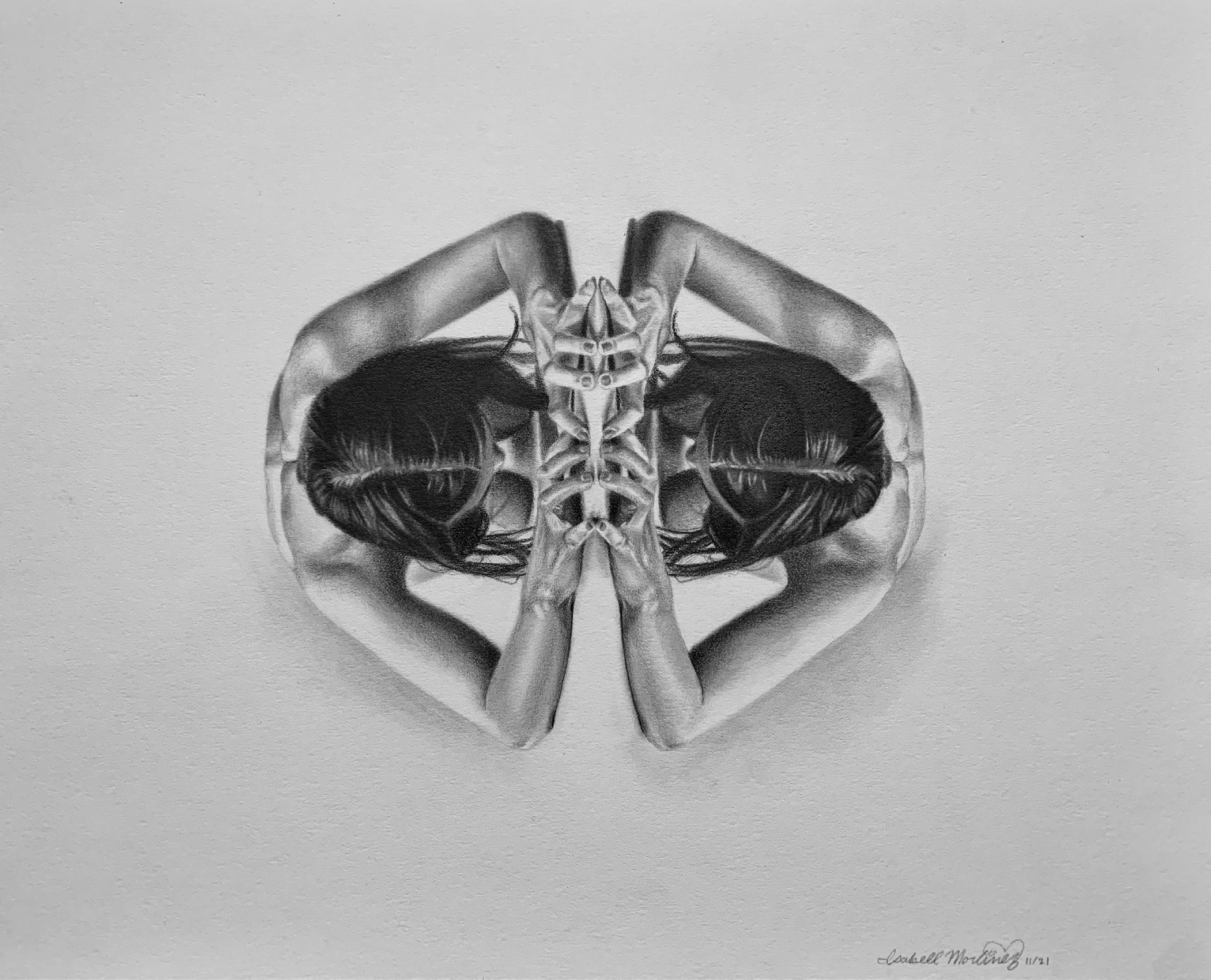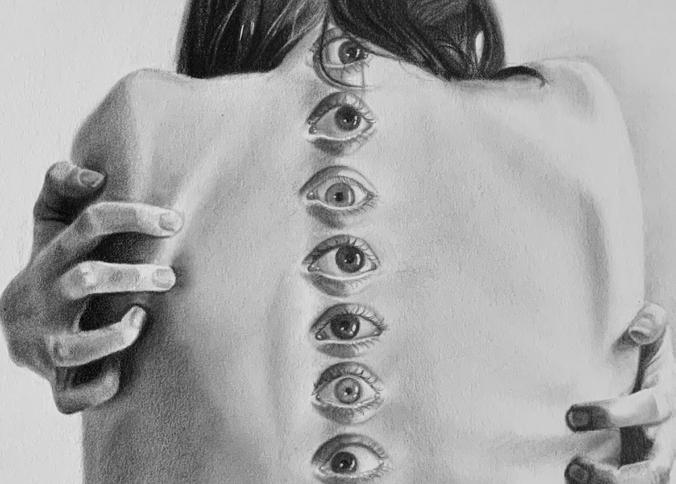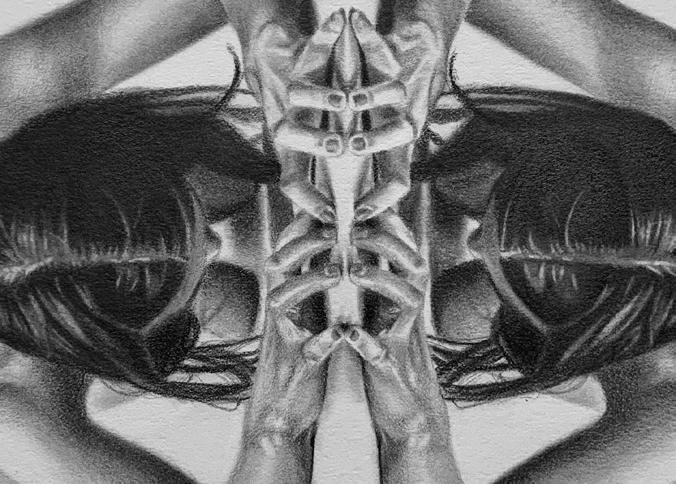Normal Noise























































EDITOR IN CHIEF Kay Northrop
FEATURES EDITORS Dunya Mostaghimi

LITERARY EDITOR Surabhi Sajith
DESIGN & ARTS EDITORS Anna Belding Claudine Inocencio Kelsey Phillips
MARKETING & SOCIAL MEDIA INTERN Helenna Gu
FACULTY ADVISOR Elizabeth Meloy
Normal Noise is a semesterly magazine supported by Barrett, the Honors College at ASU. Each issue provokes conversation about the complexities of everyday life through long-form journalism and art.
Normal Noise is student run. Views expressed in the magazine do not reflect those of the administration. You can reach the editorial board at normalnoisemag@gmail.com.
Like Normal Noise on Facebook, check out our website at normalnoisemag.wixsite.com/my-site and follow us on Instagram @normalnoisemag.
I’d Like to Speak to the Manager (of Life)
Dancing Alone i don’t recognize her
Fandoms: the Cornerstone of Identity
Sour Note
Money Matters
Artists Spotlight
8 12 16 20 26 28 31
Kate Rogers
Surabhi Sajith Aki Sagi Sabrina Kenoun Helenna Gu Dunya Mostaghimi
Nonfiction Nonfiction Poetry Nonfiction Nonfiction Nonfiction
Dear reader,
Welcome to the “Self” issue!
Renowned developmental psychologist, Erik Erikson, theorized that from the ages of roughly 13-21 years old, individuals experience a psychosocial crisis with the fundamental question being: Who am I? If this crisis is not properly addressed, a person is left with confusion as to their role in society and what their true identity is. (This can reappear later in life as an identity or midlife crisis; think: a 55-year-old man buying a motorcycle and partying with 20-year-olds.) While many of us have already been questioning elements of our identity by the time we start college, campus is a common site for further exploration of ourselves and who we want to be. As such, our editorial board felt this was a timeless theme to delve into.
The concept of one’s “self”— of identity — is the basis of our entire perceptual worldview. From it, we are able to understand the micro and macro environments that we occupy and our place in them. Ultimately, our understanding of ourselves lays the foundation for how we interact with others, how we approach our local communities, and how we respond to global crises. With that being said, this relationship between self and community is not unidirectional; the communities we inhabit can also have a massive impact on our personal identity.
This edition includes an array of interpretations of our theme, from a personal account of gender-based double standards in fan culture to the impact of illness on one’s identity to an examination of the “coming-of-age” narrative through a lyrical analysis of Olivia Rodrigo’s debut album, SOUR
We thank Barrett, the Honors College at ASU — Vice Provost and Dean Dr. Mark Jacobs, Dean Dr. Kristen Hermann, Ellyse Crow, Johnny Travis, Ashley Brand, and our faculty advisor, Dr. Elizabeth Meloy — for all their encouragement and continued support that empowers us to foster a critical atmosphere at Barrett. We thank all of our contributors, who offered a piece of themselves to be included in these pages. That is not something to be taken lightly, and we are eternally grateful for it. We also thank our editors and interns for their diligent work assisting our contributors and crafting this magazine step by step. Lastly, we thank you, dear reader, for joining us as we explore “self” and all its implications.
Sincerely, Kay Northrop
Editor-in-Chief,Normal Noise
Please. Whatever you do, do not try to relate to me. You’re only going to make me feel worse.
It took me an entire year to finish reading The Bell Jar. It’s not that I thought it was bad; it just wasn’t what I expected. I set out to read the book in hopes of having some grandiose moment of catharsis where suddenly, I’d feel not just understood, but validated; like most people that read The Bell Jar, I wasn’t in the best place… mentally (that’s code for clinically depressed). I needed to find comfort in knowing I wasn’t
the only person who could feel so hopeless, disappointing, and exhausted while having no actual reason to be any of those things. I figured if there was anyone who could make me feel less alone in my mental decay, it would be the notoriously sad Sylvia Plath. If I could see someone else in the state I was in, maybe I’d be justified. Maybe I could be depressed without feeling like I was being dramatic or lazy—I’d know it was okay to not be okay. What I really needed was to see someone else’s journey to make sure mine was allowed. But as soon as I began to read, I felt betrayed by Sylvia. Here she was, writing the Holy Bible for depression and I couldn’t even relate to it. Esther Greenwood was deeply depressed—I thought if anything, she would humble me. Maybe my anguish would pale in comparison and even pull me out of my mental paralysis. But it only made me feel worse. It seemed like even though she was suffering, Esther Greenwood was still somehow successful. She had a scholarship, a prestigious internship, and at the end of the day, she was still brilliant. Even at my best, I’ve never gotten a scholarship or had an impressive internship and the only time I ever felt brilliant was when I would take adderall during finals week in high school. How was it that Esther Greenwood made depression still look productive? All I could do was sleep for thirteen hours a day and binge watch The Sopranos. Why didn’t my dysphoria feel as successful as Esther Greenwood’s?
I remember watching Lady Bird and thinking, “Is this it? Did I finally find the film that feels genuinely relatable?” Lady Bird knew she was special but had absolutely nothing to back it up. She didn’t have good grades and she wasn’t particularly gifted in any specific thing and yet, she still felt destined for something great. In high school, I wasn’t a great student but I wasn’t the worst either. I was somewhere in the middle where I wasn’t impressive but I wasn’t underwhelming. Whatever I was, it wasn’t enough to get into any of the out of state schools I applied to (NYU, if you’re reading this, you’re dead to me). But the same wasn’t true for Lady Bird. She ended up triumphing like she knew she would and got into the New York school no one believed she could get into. Meanwhile, I was a third year student at ASU, still waiting for my Lady Bird moment. Lady Bird, I love you, but you don’t know mediocrity. You aren’t one of us. And honestly, if I could relate to any character in Lady Bird, it’s unfortunately Timothée Chalamet’s character and that is not something I am proud of. Kyle? C’mon, Greta. Why do I gotta be Kyle? …
It wasn’t until I read Into the Wild that I finally felt like I had come across someone that I deeply resonated with. In learning about the intimate details of his life through the book, Christopher McCandless appeared to be the person I was looking for. So much of his thoughts and opinions seemed to overlap with my own. But most importantly, he seemed like a normal person. In other words, he wasn’t a written character. What made me feel connected to Christopher simultaneously made me feel disheartened. Christopher may have been a fully anatomical person but what he did was so opposite to how many people live their lives. Unlike most of mankind, he lived out his morals. He was the king of “practice what you preach”. His philosophies and actions were so intertwined that it made him less tangible, less human. Humans have flaws. We are hypocrites and are often scared to be our truest selves. It just so happened that I had stumbled upon one of the few exceptions. Once again, the alienation kicked in.
Nailahni Thompson at least i know more today than i did yesterday 17 x 14 in.
Colored Pencil

I couldn’t relate to these people. I felt so trapped in myself. I knew who I wanted to be, but it felt like none of the tools I had could get me there. Why did I feel so different from these characters in the most disenchanting way possible? Feeling misunderstood is not cool or fun! I repeat: feeling misunderstood is not cool or fun! I felt like the only character I could ever relate to is that piece of crap Benjamin Braddock. He had everything and still chose to have nothing. Not because it was what he believed in like Christopher McCandless, but because he was a little brat from Pasadena. Is that me? Am I Benjamin Braddock? Please tell me I am not Benjamin Braddock. What kind of rat bastard goes for a mother and her daughter? Ok, maybe I’m not Ben (Thank god. I was really worried there for a second). …
We seek out different forms of media, whether they be films, music, or books to make us feel related to— to feel less alone and perhaps even understood. Whatever the medium—we look for a piece of ourselves within them (or at least I do. Maybe I just have main character syndrome). But this method has its flaws. I often find myself feeling more isolated and insufficient than I did before. When we look for ourselves in art and we do not find what we are looking for, we are left to compare ourselves to the few pieces that remain. Looking at ourselves in pieces rather than as whole is a short cut to low self esteem. When we’ve never seen someone take our path, it’s difficult to see how we make it out and we are deprived of both the comfort and confidence of knowing we are not alone.
It can feel so disheartening to know you won’t always triumph in the way others have.
It can feel so disheartening to be the first person to be you and be on your own journey.
But just because it hasn’t been seen before, doesn’t mean it is wrong. It just means that it is yours.
It can feel so disheartening to see that your version of mediocrity doesn’t feel or look like that of others, whether they be real people or fictional characters. …
Maybe we should try watching more French films. I hear those have more realistic endings.
Kate Rogers is perpetually in college. She studies French and Film Production at ASU in hopes to move to Europe to escape the soul crushing realities of capitalism. She is very bad at texting people back but promises it is nothing personal. Her best quality is thinking that she is the same height as every man that she meets.

I stretch on the creaking, wooden floor. A single stomp sends thousands of vibrations through the quiet studio, reminding the world that I exist. Looking into the mirror, I see hair tangled in front of my face, frizzy from hours spent in this humid, sweaty room. My shirt is drenched with vulgar smelling sweat, scaring away anyone who may want to watch me practice. My feet are caked in bruises and blisters, a reminder of the years of training that warrant my title—a Dancer, who is nothing without her Music.
I pose in the center of the stage, looking into an endless abyss. There are over 500 people seated in front of me, yet all I see is black. I am drowning in a silken, traditional dress, being pushed to the floor by the weight of sacred jewelry handed down by my family. My lips slowly creep up to my cheeks, revealing what many would call a smile—what I would call a facade. Music blares through the speakers behind me, and my body moves automatically, matching my feet and hands and expressions to the emotional lyrics playing. Before I can recognize what I am doing, I am bowing to the audience, who is applauding louder than the music fading behind me. I complete one last movement and glide off stage. The lights are off, and all that is left is me—a Performer, who is nothing without her Audience.

I collapse into the makeup chair left in the green room, just two doors from the auditorium. Just two minutes ago, I was adorned in glitter, jewelry, makeup, and a feminine silhouette. Now, I face myself with smudged makeup, frizzy hair, and a loose dress, exposing me for the ungraceful person I am. My bangles clatter on the floor, releasing the hairs on my arm from their metal bondage. In this room I am not anything. I cannot be a dancer without my music. I cannot be a performer without my audience. By myself, I struggle for an identity. By myself, I am Lonely.
I rest my feet in an ice bath and open my laptop. As I navigate through my YouTube playlist of old performances, I am overwhelmed with the nostalgia and love I once had for the art form. At eight, I asked my family to enroll me in dance classes and give me the chance to learn a new skill. I was encompassed in the world of performance—I was taught how to tell a story with no words, but only expressions. I learned to make sounds with no instruments, but only my feet. My own confidence grew, and I practiced for hours in front of a mirror, with myself as my only audience, and my choreography as my music, not reliant on anyone else. However, as I began to share my love for the art, I felt it drift away from me. I was only a dancer when there was music that intertwined with it, and I was only a performer when someone was watching, confirming that my skill is valuable. Dance is no longer who I am, but how people perceive and validate me. What once was a source of self confidence has now become a source of self doubt.
I return to the dance studio, studying the walls decorated with pictures of my friends and me in elaborate costumes and jewelry. After two years of hiatus, the building is still all too familiar. The pile of bells in the corner calls my name, encouraging me to try, just one more time, to find confidence as a dancer rather than to feel shunned by that title. I give in. As soon as I hear the clang of the small bells tied around my ankle, I feel a warm sensation return to my chest. Though my body knows it is about to feel tired out, it jitters, ready to take control of the stage, music, and audience. I connect my phone to the speaker to play my teacher’s favorite piece, and I am immediately enthralled in the world of music and choreography without a care as to who is watching and how I look. When I strike my last pose and open my eyes to the studio room around me, I see young children, no older than 7, and their parents applauding for me. I bow, and young girls come to me asking about how I learned the choreography and what I do to practice. The parents ask me for advice on how to keep their girls strong and resilient during their intensive training. Finally, I am able to find self confidence, rather than self doubt, in the skill set so that the people who learn from me see dance as a way to empower themselves, not make their self worth contingent on audience reactions.
Surabhi is a first-year Medical Studies major minoring in Women and Gender Studies. She currently works as Medical Receptionist for a podiatry clinic in Phoenix. She enjoys writing as her creative outlet, and uses it as an expression of her identity and background.
Gabriella Jording Church-Goers 3 x 2 in. Instant Camera, Fuji Film

I look up and into the hollow eyes of a girl standing across from me. However, I notice, she is not so much standing as struggling.
On most people, the weight they carry is well hidden. Behind makeup, Fake smiles plastered across bitter grimaces, Elation poured over apathy. Love teasing contempt. Bourgeois wealth; Rolexes, Louis Vuitton bags, plastic body parts, lips bruised with injection, jewels embedded in roughened skin.
Well hidden, like I said.
The world is full of hidden people Hardened by existence. Softened by the pretense of joy. Because we are all doomed And this life seems more than we can ask for.
But this girl I am staring at, she is hunched over, unable to bear the weight of this world. Gaunt in the presence of her life She reminds me of someone I used to know
But her hair is chopped short And the exhaustion in her eyes Says she has lived far more lives than most. Each harsher than the last. So maybe I did know her, in another time.
Purple hues dance in the hollowness of her skin
Magical in their misery
I try not to stare, I look down at my hands, Do my best to seem amused in their ridges and curves, I scrape at my already chipped black nail polish.
I count the seconds
And finally I glance back up, wondering if she has left me alone in my idleness. But she suffers in the same spot as before.
Impossible as it is, the mere seconds that have passed Have beat her further down And the air that surrounds her Seems thicker than that which surrounds me.
As she struggles for a breath, I wonder if life has truly hurt her so Or if she is weak in her essence And strong in her show. Anger courses through my veins
Hatred for this display of frailty Have I not lived through adversity? She can do the same.
So I ask her, voice dripping with bitter indignation, if the weight is much too heavy, or if she is simply much too weak. But as I begin to talk, her dry, cracked lips part and she mouths to me exactly what I say to her. Anger.
How dare she accuse me of being too weak to handle this life when clearly, she is so much worse off, crippling within herself.
Hot tears well in my eyes and one escapes, despite my desperate prayers willing it to dry up. My tear falls from her eye.
And I reach out to brush it away, her lack of composure is embarrassing me. My hand, trembling from fear or anger I cannot say, pushes through the stiff air in search of her soulless eyes.
She tries to do the same, but her entire body shakes in the effort, her frailty is showing. Our hands pull closer and closer until My fingertips meet hers
And I am ready to meet calloused skin, bony and cold, aged not by time, but misery. Yet all I feel is glass, not skin.
Aki is a Sophomore at ASU studying Business Marketing, and as for the future, she’s decided to simply see where life takes her.
Isabell Martinez Untitled 11x14 in. Graphite on Paper
Right: Untitled 12x9 in. Graphite on Paper


I used to be a very carefree kid. I would run around the house yelling about whatever interest suited my fancy that day, or singing songs, even dancing around in typical childlike fashion. But of course, as I got older, I learned that more often than not, people don’t appreciate the liveliness that we exude as children. When I would raise my voice, I was often met by my peers with phrases like “stop being so annoying,” or “I don’t want to hear it”. Naturally, that was enough to shut me up.
Usually, these hyper fixations of mine had to do with whatever book or movie I was interested in at the time, which is why nobody seemed to care.
So, I retreated into my shell, worried that every time I spoke up I would be reprimanded or given a funny look. I became shy and a little bit reclusive, and I had a very difficult time making friends. That’s not to say that I didn’t have any—I certainly did—but I’ve always preferred being alone. My favorite thing to do during recess wasn’t sitting on the swings or playing tag —it was reading. Through books, I was able to venture into worlds that no one else could see, or become someone else entirely. But most of all, books helped me feel like I belonged.
In reality, it was one book—or book series, more accurately—that gave me this refuge. And with full transparency, I am unashamed to say that the magical world of Harry Potter has undoubtedly shaped my identity throughout the course of my life.
(SIDENOTE: I’ll venture a little bit more into the specifics of why the Potter-verse has me in a chokehold later in this piece, but before I do, I would like to issue the disclaimer that I do not in any way agree with J.K. Rowling’s views towards the trans community. That said, if I refer to her again, she will be called “She Who Shall Not be Named”.)
But Harry’s adventures have never been alone in the task, accompanied by the likes of the MCU, The Hunger Games and Divergent trilogies and many other book and movie series along the way. Without the sense of familiarity and community each of these worlds provided me, I surely would not be who I am—or maybe even existing, for that matter.
Knowing that, and how people reacted to a younger me being so invested in them, it makes me curious about the concept of fandoms, and how fandoms have shaped myself and those around me into who we are today.
I have a few gripes about fandoms, don’t get me wrong. When sports fans are passionate, people are understanding and supportive. But when Marvel or Potter fans have lines out the door at theaters and bookstores, people tend to call us deranged, obsessive or crazy. There is an intense double standard between the different types of fandoms, despite us all having our respective interests for the same reasons.
Take Taylor Swift fans as an example. As a hardcore and unwavering Swiftie, I will be the first to say that the community of fans which Swift has built for herself rises above all others that I have been a part of where the music industry is concerned. From the time that I was a child, Taylor Swift and her music made me feel a sense of belonging, a sense that I would never be alone even when I felt that way the most. There are millions if not billions of others like me, who have gone as far as to create entire social media pages for her listeners to build a community and speculate on what comes next.
And they’re just wonderful, wholesome communities to be a part of—until you enter the TikTok comment section. More often than not, I scroll through to find multiple comments calling Swift’s fans atrocious names, belittling her songwriting, and our reactions.
The same can be said for fandoms both book and movie. With the rise of TikTok, there has followed an increased relevance in different types of fan-art—whether it be illustrated fan art, fan theory videos, fan
edits or even fanfiction. Personally, I am thriving in the age of BookTok, DracoTok, MarvelTok or whatever self-proclaimed niche the algorithm is itching to send my way on a particular day. But the biggest struggle comes in the comment section of each of those niches from the toxic fanboys who claim we will “never know enough” about our niche to be considered true fans. But when I tell people about the content I’m consuming, I am often met with a funny look or some form of “I have never even heard of that”.
Just like with the Taylor-Swift-related-disdain, there is a mixed bag of reactions by those who are either outsiders or seasoned veterans to these communities (who are usually male, in my experience), like to belittle the excited behavior of active creators, asserting the assumption that they somehow know better about the niche than they do, or that you are essentially not good enough to be a part of your fandom.
I speak from experience when I say that most of these comments have been directed towards me by men who believed themselves to be superior to me, and whether this comes from a place of ingrained toxic masculinity or a need to belittle others, I am unsure. But I will say that it exudes the same energy as the comments along the lines of “You watch *insert male-dominated sport here*? What do you know about that?” And the fact of the matter is, any member of a fandom could know all there is to know, or frighteningly little about their chosen interest, but why should that preclude them from it, or make them feel inferior just because others don’t care?
Not to be a complete ass, but in the same way that most cisgender, heterosexual men that I know don’t care about Taylor Swift, I couldn’t care less about Tom Brady’s retirement. The difference between the two is, one of the people on the receiving end of those statements will get offended, and just a hint: it’s NOT the Taylor Swift Fan.
I know this sounds like I’m out to get the men reading this, and I’m not. I am however a bit tired of the aggressors being the ones who get caught up on the testosterone flowing through their veins. If my complaints aren’t enough, riddle me this: why is it that everyone is insanely supportive when male public figures like Tom Brady flip flop in and out of retirement, but when Taylor Swift briefly debated retiring from music in 2016, people were calling her weak and sensitive?
Anyhow, I digress. I can save the Swiftie rant for another time. Despite the differences in how these types of fandoms are perceived by outsiders, they do share a commonality: they mold us into who we are. Sticking to football fans, there are a great number, regardless of gender, who hold the sport near and dear to their hearts. For many, it may be because of fond family memories, for others, it may be because they play the sport, as well as a myriad of other reasons. Nonetheless, football becomes so ingrained into their daily routine that it becomes impossible to imagine themselves without it.
That is how I view my love of both Harry Potter and the MCU. I don’t have any fond family memories of either (my parents aren’t big into sci-fi/fantasy), but I will say that Harry Potter has saved my life on a number of occasions. I read the series for the first time when I was nine years old, and have reread it once a year ever since (this year will mark reread #14). I have a physical disability, which, as you can imagine, has had a profoundly negative affect on my confidence my whole life. But Harry and friends allowed me to dive into a world that was entirely my own. I made friends easily there, I was able to harness the power of adventure and magic, and most of all… I belonged.
It is clear from the large number of people in the fanfiction and TikTok Potter communities alone that I am not the only one who views it that way, either. Many of us found a home at Hogwarts, and no matter how old we get, it will always be there.
(I do want to note that that has changed in recent years, as She Who Shall Not be Named has made it abundantly clear that many of us would not be accepted within the walls of Hogwarts for who we are, and ironically enough, contradicts the world that she has built directly in doing so.)
So, I say this not in support of She Who Shall Not be Named, but as a believer in the safe haven I constructed as a child: while the creator of Harry Potter lives with malice and ill-intent in her heart, the fact remains that the message she imprinted in the hearts of children around the world was abundantly clear: Hogwarts was about accepting all witches and wizards, regardless of their identity or history. It was a home for the entire wizarding world. It is a place that no longer belongs to her, but to the fans. And it is up to us to ensure that Hogwarts remains a safe place for us all, regardless of its foundation. If we didn’t think that way, it would be heart wrenching for many of us to let go. That is the beauty of fandom. We can make things our own, things that have been sullied, or portrayed in a way we do not like. Fandom allows these worlds to belong completely to us—to become part of who we were.

come of age until 18.
I was a late bloomer, if you will. By virtue of being young for my grade, my entire 18th year happened after high school had already ended (though I never got a proper graduation, and it wasn’t just my senior year that turned sour—the whole world came to a standstill). Most of the things associated with a coming-of-age I didn’t experience until I left high school, which meant I’d spent most of those years feeling like I’d already fallen behind.
That magical milestone of adulthood made for an eventful year. 18 was me setting out for college on a campus I had never visited or seen in person, moving across the country with no certainty that I wouldn’t be kicked out and sent home, having no connections or familiar faces to turn to for comfort. 18 was experiencing my first depressive episode. 18 was traveling for the first time with my friends, road tripping to Flagstaff and later flying to San Francisco. 18 was my first kiss, which became my first boyfriend.

And yes, I knew that so many of the cultural milestones associated with coming-of-age were completely arbitrary, and everyone has their own timeline so comparison is pointless, but why did my timeline have to be the one that lagged behind?
Maybe feeling like you’ve fallen behind is a rite of passage in and of itself. After all, this constant comparison is present in many teenage anthems—think Echosmith’s “Cool Kids”, Taylor Swift’s “You Belong With Me”, or even The Killers’ “Mr. Brightside”. More recently, we could add tracks from Olivia Rodrigo’s debut album, SOUR. Released in May of 2021 when Rodrigo was 18, the album has quickly become a staple within the coming-of-age genre.
For me, perhaps no other mainstream artist was in a position to be as relatable as her. How often do you get to witness a fellow Asian-American 18-year-old undergo stardom? Up until then, I never had. Artists like Mitski, Japanese Breakfast, and Rina Sawayama have all made incredible, deeply cathartic music, but getting to experience Rodrigo’s songs in real time, with her, felt different.
Inspired by the comparisons she noticed herself making while scrolling on social media, Track 9 on her album, “jealousy, jealousy” details this ever-so-ubiquitous, seemingly inescapable thief-of-joy. The song features a touch of teenage angst, as Rodrigo mentions how “Com-comparison is killin’ me slowly”, saying “I’m so sick of myself
Rather be, rather be / Anyone, anyone else”. But her lamentations are also self-aware–she notes that “Their win is not my loss / I know it’s true” in the second pre-chorus, and even a little self-incriminating when she notes “And I see everyone gettin’ all the things I want / I’m happy for them, but then again, I’m not”. Much like how I felt about falling behind, Rodrigo’s recognition that there’s enough success for everyone doesn’t necessarily stop her from comparing her own achievements with others’. These conflicting feelings around comparison only lead me to bounce between panicked envy towards others immediately followed by guilt and self-loathing that I can’t just be happy for them.
In the song’s chorus, Rodrigo notes that, “I think I think too much / ‘Bout kids who don’t know me”, a particularly pertinent line for someone with a massive following. The huge popularity surge Rodrigo experienced following the release of her hit single, “drivers license” has grown her fanbase but also her critics. Though she recognizes that it might be to her detriment to worry about what others think of her, she can’t help it. Whether you are an international pop star with millions of followers or an average teenager, feeling self-conscious and fearing judgment from others is a universal experience, especially during adolescence. Even now, I still find myself worrying. Was I interesting in that conversation, or did I talk too much? Maybe they think I’m self-absorbed? Do they actually like me, or are they just being nice? Being self-conscious comes naturally, which is why so often we claim we “don’t want to be perceived”. This fear of judgment seems irrational, because we are told that the only person whose opinion truly matters is your own. How do you feel about yourself? Are you proud of your actions and the person you are? But the self-judgment is also present when Rodrigo notes that “I think I think too much”—another annoyingly adolescent experience. When we get caught up worrying about what others think, we then tend to beat ourselves up about it, which is just as futile.
During the bridge, Rodrigo remarks, “All I see is what I should be / Happier, prettier, jealousy, jealousy”, giving insight into the things that she places value on in her life. She comments on vintage clothes and vacation photos in an earlier line, alluding to comparisons of happiness. Immediately after, she mentions being prettier, which reveals a somewhat insidious form of comparison exacerbated by social media. Putting the two together alludes to how “prettiness” and “happiness” seem almost synonymous to the teenage girl, as we are often told that prettiness can bring happiness. For me, unlearning that assertion that I’d internalized for so long has been a huge part of growing up and maturing.
More recently, I find myself confronting new pressures which Rodrigo sings about. Her line, “Got a pretty face, a pretty boyfriend, too”, points out how another important tenet of adolescence is this emphasis on romance. For many teenagers, there is no self without an other. The other half, partner-in-crime, soulmate that we are all taught to seek out is inherently part of how we view ourselves and our experience. In tying prettiness to romance, Rodrigo alludes to how the two are both engrained in one’s self-image and subsequently can greatly impact how we value ourselves. This is just another avenue that we, particularly young girls, are taught that physical appearance is an end all be all—not only is being pretty synonymous with being happy, but also being loved or finding romance. For the first 18 years of my life, I’d never been in any kind of romantic relationship, but I had been subjected to the onslaught of typical teenage thinking that life with a partner was infinitely better. If they don’t center on romance, every coming-of-age movie I can think of—Mean Girls, Clueless, The Perks of Being a Wallflower, Lady Bird, The Edge of Seventeen—are at the very least not devoid of it. SOUR itself, as a coming-of-age album, also includes many songs about love and heartbreak, further cementing their place in the cultural fabric.

But now, it’s not just movies and music that shape the ideal teenage experience. For Rodrigo and many other young girls, including myself, this new era of social media—which inspired “jealousy, jealousy”—makes it so much more difficult to get lost and completely lose your sense of self. Of course we are still inundated with edited pictures of flawless, posed, Instagram models, but perhaps equally insidious are the micro influencers determined to make Instagram casual again. Candid mid-laugh photos in perfect lighting of girls sipping espresso martinis and sporting one-of-a-kind vintage Prada sunglasses from Depop feels just as painfully unattainable. The illusion that these pictures aren’t somehow more curated, that you didn’t have to take a hundred shots to find the perfect photo that looks convincingly natural and yet also impeccably beautiful makes it seem accessible, like anyone could live this life. They aren’t multi-millionaires with businesses and lip fillers traveling around the world. Maybe they’re other college students or twenty-somethings that live in the same city you do. Yet these pictures still inspire the same ache of jealousy that we are so prone to feeling—if not even more so.

The relatability in Rodrigo’s lyrics suggest that even celebrities experience this jealousy. For every girl out there jealous of Rodrigo, of how pretty and successful and talented she is, of the lifestyles she gets to live—meeting her celebrity idols, befriending other pop stars like Conan Gray, wearing designer clothes and doing magazine photoshoots—there are people that even Rodrigo is jealous of. At that point, what does it take to be able to avoid this jealousy and see ourselves the way we are, or the way others see us?
Personally, this jealousy isn’t something I’ve been able to outgrow–after all, coming-of-age isn’t an end-all-be-all. The things you worry about change, but the anxiety and the comparison seems to remain. When I was 12 I envied the girls with UGG boot collections; when I was 16 I wondered why I’d never even gotten close to kissing a boy, much less dating one, when so many people around me were; when I was 17 I was ashamed that I failed to get into the college I’d wanted to go to while all my friends got admittances to prestigious schools.
Now at 19, there’s still no shortage of areas to feel behind in, career opportunities to feel jealous of, or relationship experiences to feel left out of. I still can’t seem to escape the feeling that I’m always chasing, unsure who’s back it is I’m looking at in pursuit.
But I’m still just a teenager, so who knows? Maybe 20 is the year I finally figure it all out.
Helenna is a second-year Barrett student majoring in Digital Culture with a concentration in Graphic Information Technology. She’s interested in web and graphic design, and also loves learning foreign languages. Currently, she can be found reading her next book club novel or exploring new cafes!
Growing up, the concept of wealth was difficult for me to understand. Societal norms had ingrained in me the importance of working hard to earn a living, but the exact value of those green papers and metallic circles was unclear.
When I reached middle school, the tides quickly turned, and my knowledge of the value of money—and its impact on my self-perception—quickly transformed from one of a thirteen-year-old to a thirty-year-old.
Only one year before, my friendships with my classmates knew no fiscal boundaries. Suddenly, it was as if a hierarchy of associative cliques had developed overnight. The stark contrast between these two social systems of an ignorant-elementary-free-for-all and the dark uncharted territory of junior high had one common denominator–affluence. The trigger that set off our bomb of differences was how much money our parents brought home. After graduating from elementary school, suddenly people were ashamed of receiving free food from the school and wearing their sibling’s hand-medowns. Their self-worth became a quantitative measure rather than a qualitative one. They associated with people of similar class standings and collectively pined for the days when thrifting at Goodwill would be trendy rather than a sign of financial limitations.
On the other hand, my not-so-fellow peers (the trust fund teens) had been elevated to the station of popularity, aka the “Plastics” (as coined by the culture-defining film Mean Girls). Their parents’ wealth bought them not only new A&F jeans but also a matching self-confidence and social boost.
But those of us who were “without” threw ourselves grand enough pity parties that built up our self-confidence in the same way. We may not have had style, but we had a personality, awareness of the world, and authenticity we assumed our classmates with fuller pockets absolutely lacked. This came not from us being fundamentally different from each other in any way. Simply put, we conjured up a self-perceived difference, based on nothing other than wealth, and exacerbated it into everything we did in deciding who to befriend and how to associate with the “others”.
Taking a step back to reflect on how much myself and others have used material means to create and justify differences ranging from our sense of humor to perspective of life and aligning ourselves within a social hierarchy because of it is almost laughable.
Green paper and metal coins only have as much value as we prescribe to them and if we take it farther than a monetary value and how different amounts of its possession determine the type of people we are in the world, it is so easy to lose ownership over the direction of our lives and feel controlled by inanimate objects.
Taking back the power and deconstructing these man-made social cliques thus begins with dissociating money from literally anything else other than a transactional item used for purchasing. It does not have to be a determinant of popularity, coolness, fashion sense, personality, and importantly self-worth. Because the current state of our society requires fiat money for survival, however, its usage is unavoidable. It also does grant a lucky few with daunting amounts of privilege that most of us will never begin to understand. But that does not mean we need to accept the social values that are attached to money just because they are so integrated into the present-day culture.
This starts with consciously befriending all different social classes, and holding ourselves accountable when we make assumptions about people’s character because of their wealth.
Our true self knows no concept of money. It knows not the social class or group we fit in best with—we put ourselves in those boxes. Discovering where we really are comfortable within society, amongst who, wearing what we’d like and finding ourselves should not be related to the lining around our wallets. But it is a conscious choice we have to make every day.
Society tells us that money matters. But it does not have to be the end-all, be-all to our lives. Working around societal barriers to achieve success despite social class limitations will not be an issue that disappears from our lives overnight. But in regards to changing the perception of money we all have on an individual level in terms of its relation to our self-perception, it is entirely under our control. We can work to dissociate these two in order to dissolve boundaries along class lines and stop viewing the world exclusively through the perspective of money. And once we take off the green-tinted glasses, we are able to see the world, each other, and ourselves in a whole new light.
Dunya is a first year student from California studying economics. She is passionate about community building and service, especially working with young people in the Junior Youth Spiritual Empowerment Program. In her free time, you will find her watching Turkish dramas and reading realistic fiction novels.
Isabell Martinez Untitled 12x9 in. Graphite on Paper


I’m a 20-year-old junior at ASU. Majoring in Painting & Drawing and minoring in Anthropology. I use art as a medium to understand myself and the world around me. My work typically focuses on aspects of my culture and identity.

Gabriella Jording is an artist based in Phoenix, Arizona. Studying Art History at Arizona State University, she pulls inspiration from what she learns in her classes. Her work often bends and shapes into whatever art period or artist she is studying at the moment. She pulls inspiration from as early as the ancient Egyptian works all the way to the Impressionist period. Gabriella creates in a variety of mediums and is always looking to expand her materials. Some of the mediums she primarily works in is: clay, paint, sculpture, oil pastel, and ink. Aside from her studies, Gabriella draws out inspiration from her surroundings, as well as, her experiences. Her work reads as a journal of her daily findings and continuous studies. The goal of her art is to tell stories and document her studies through her work.
18, 30
My work surrounds the concept of self and narcissism, the crippling obsession we have with our bodies or image


Ash Kingery is a senior in museum studies with a long-standing passion for digital art. Some of his favorite artistic subjects include queer love, body horror, magic, and mythology, and he has a special fondness for comics as a medium.
 Isabell Martinez
Isabell Martinez
Calling all writers, artists, creative minds and inquisitive personalities. Here at Normal Noise, we’re always on the lookout for contributors, whether they be in areas of writing, copy-editing, graphic design, or art.
Join us by emailing normalnoisemag@gmail.com following us @normalnoisemag on Instagram or checking us out at normalnoisemag.wixsite.com/my-site

A Barrett, the Honors College publication